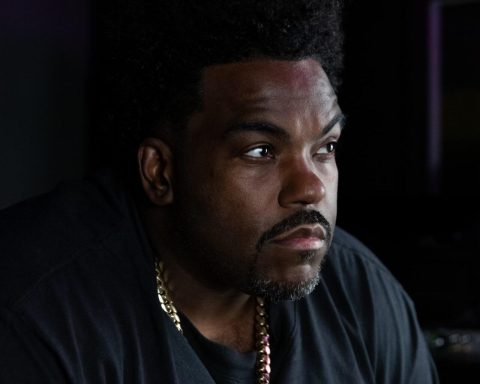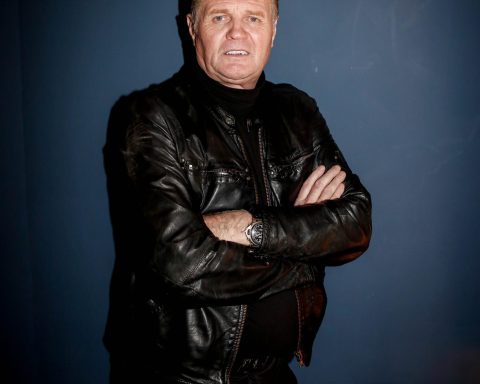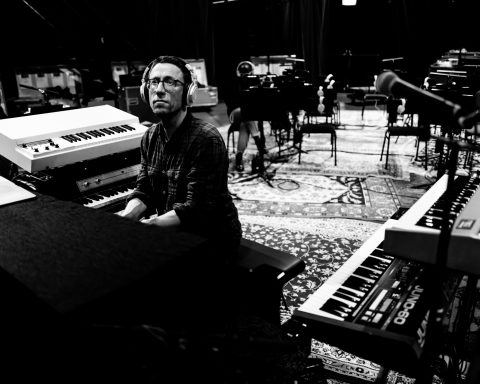Frequently, an artist’s stage name eclipses their given one to such an extent that we only refer to them by their public moniker; take Sting, also known as Gordon Sumner, or Stefani Joanne Angelina Germanotta, who most fans call Lady Gaga. Bassist-composer Ben Marc, born Neil Charles, isn’t too concerned with all that. “I feel like people just call me to be who I want to be,” he says from his London studio, “which is wonderful.”
12-Bar Birmingham Blues
Surrounded by racks of synthesizers and pedals, a double bass, and a humble drum kit in the corner, Marc appears in a happy, creative place. Like his varied musical education and kaleidoscopic range of collaborations, the casual collision of gear reflects a musician working without boundaries. Jazz, hip-hop, classical, and experimental sounds all coalesce on the bassist-composer’s upcoming release, the masterful Who Cares Wins.
Marc grew up in Birmingham and formed his core identity in the UK’s Midlands. “My parents moved out of Handsworth in the ’80s and into this affluent area,” he says of that stretch. “We were the only family of color on our street. I ended up just taking up hobbies like swimming and karate.”
After picking out a walking blues line on his auntie’s guitar, Marc’s propensity for bass figures was apparent to all around him. “I was about seven or eight, and she was learning the 12-bar blues for absolutely ages,” he remembers. “One afternoon, I got it within 20 minutes, and she was like, ‘This is incredible.'”
From there, lessons expanded the player’s budding horizons. “She brought me to her guitar teacher from New Orleans, who was super sick,” Marc says of that early musical mentor. “The very first tune he put in front of me was ‘Skylark.'”
Still, he didn’t find a hometown scene in Birmingham. “I was in classical orchestra, and that was it,” he says. “But outside of that kind of organization, I wasn’t playing with my peers, which is a shame, really.”
"I've got a skill to be able to read music really well, and then be able to improvise, and do the other stuff in between."
The Breaks Come Knocking
With all his legendary associations since, Marc may be making up for lost time. “I’m lucky I chose bass,” he says, reasoning his success accompanying so many musicians of note. “I’ve got a skill to be able to read music really well, and then be able to improvise, and do the other stuff in between.”
Seeking a bigger pool, the young bass player made his way to London. In the capital, his combination of being a quick study and a dynamic player led to some pivotal career highlights. “My first big break came from playing with Terence Blanchard when Derrick Hodge needed to do a classical gig in Edinburgh for a week.”
That chance occurrence spread his name among the US jazz cognoscenti, and before too long, another unique position materialized. “Two weeks later, Sue Mingus calls me up and says, ‘Can you come in for like a three-week tour?'” The memory of this turning point clearly still delights Marc.

An Interstellar Voyage
Yet, his most otherworldly musical expedition was still to come: a role in the enigmatic, long-running Sun Ra Arkestra, founded by the interstellar free jazz genius of the same name. “I was at an incredible place in London called Cafe Otto, and Shabaka Hutchings, who is a really good friend of mine, was creating something with Sun Ra Arkestra.”
From there, fortune once again took hold. “The bassist lost his passport or couldn’t get a VISA, and I ended up taking on the tour,” he recounts. “They’ve got four massive pads of music, and at any stage they can call charts from any one of them.”
Rehearsals were a blast, but the real test came prior to Marc’s maiden Arkestra show. “Before my very first concert, two members came up to me and said, ‘You sound great in soundcheck, but it’s every man for himself now.'”
He praises the unpredictable nature of the Arkestra collective as one of the core reasons the music remains so essential to the jazz canon, particularly in the lack of conventional structure. “There’s so much stuff going on in that band, the chaotic-ness of it, but the beauty is incredible.”
"Before my very first concert, two Arkestra members came up to me and said, 'You sound great in soundcheck, but it's every man for
himself now.'"
The Caring Effect
That sense of beauty also permeates Marc’s solo work, particularly a pair of dazzling genre-hopping solo albums: 2022’s Glass Effect and the upcoming Who Cares Wins. Both feature his trademark blend of head-bobbing bass grooves, global flourishes, inventive samples, and the occasional nod to his classical past via string arrangements.
The core difference between the two works lies in the circumstances of their composition; Marc created the latest album during the height of the pandemic while volunteering for the UK’s National Health Service.
“People were dying, man. It was just insane,” he says, reflecting on that trying period. “I kept on playing music, hoping that would give me inspiration. And then they started putting out ads for helpers as a local kind of delivery service, so I ended up doing that.”
The resulting album was completed once a sense of normalcy returned, but the ghost of the pandemic looms in the corners. Who Cares Wins is full of shifting emotional hues, perhaps a testament to the difficulties the world endured.
"I kept on playing music, hoping that would give me inspiration. And then they started putting out ads for helpers as a delivery service, so I ended up doing that."
The Art of the Subtle Flex
Who Cares Wins features names like Greek chanteuse Σtella, Confucius MC, and Arrested Development. The hip-hop collective is an ongoing creative partner for Marc. “We started with the ‘All I See Is Melanin’ track they put out as a single for their last album,” Marc says. “Speech vocalized about five songs for Arrested Development’s new record, and I was like, ‘Can I have this one?'”
The resulting “Back Again” is a standout moment on a record full of eclectic highlights. “The subtle flex, man, I created it,” goes a lyric from a song that could serve as a thesis for the album, filled as it is with nuance and delicate touches.
To that end, the stirring strings at the tail of the title track and open a wormhole into what Marc could do with his symphonic background; it’s an avenue he’s keen to explore in the future. “I’ve still got a huge ambition of writing for an orchestra,” he reveals. “I think that will be a really beautiful moment.”
Analog in the Air
Gluing the album together is a bespoke analog aesthetic, underlined by the piles of vintage gear in Marc’s space. “When I managed to get some money together, I started buying more stuff,” he says of his impressive collection. “I’ve got a bunch of pedals, including the RE-202 Space Echo.”
It was while working with another acclaimed partner, the British-American group Gabriels, that Marc encountered some old-school Roland gear in action; the impact was instantaneous. “They’ve got a JUNO and they’ve got a JUPITER, which are great, and I sampled them.”
Much like the classic jazz and classical sounds he grew up with, Marc’s desired result is always to capture the authentic spirit of a moment, whether live or on a recording. “I want that air,” he says of his ongoing artistic quest. “I want that feeling of presence.”
"I needed to put myself in a box in terms of titles. But Ben Marc is two nicknames, so it's an extension of me also."
What’s In a Nickname?
With so many projects, does Marc consider himself a bassist, composer, or simply an artist in the world? “I needed to put myself in a box in terms of titles because certain people in the free jazz scene wouldn’t get Ben Marc and vice versa,” he explains. “But Ben Marc is two nicknames, so it’s an extension of me also.”
Ultimately, for the multifaceted artist, everything within him is part of an interconnected web of expression, an approach that eschews barriers for radical reinvention. “I practiced like 25-30 minutes today,” the bassist says with a grin. “Was that Neil Charles or was that Ben Marc? I don’t know.”







